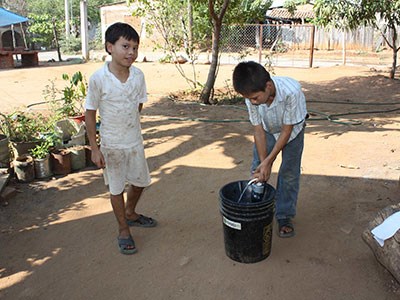A mosquito trap developed by a Laurentian University researcher will find its way to Home Hardware stores across Canada by the new year.
Laurentian University chemistry professor Gerardo Ulibarri, who focuses on medial chemistry and preventative health, teamed up with Waterloo-based company Maxtech Mosquito Control Inc. to develop an ovitrap — a device that resembles a bucket with a funnel, that uses attractants to lure mosquitoes and have them lay their eggs in the trap.
The trap features paper landing strips where certain species of mosquitoes — those that carry diseases harmful to humans — lay their eggs.
Every few days a water pump — operated manually, or in some models, with an electric motor — washes the eggs down the funnel into a filter.
Once the filter dries, the eggs inside die.
The water at the bottom of the bucket is recycled and used to wash out more mosquito eggs.
Maxtech Mosquito Control's consumer version of the product will be available for retail in February 2015 for $300 under the company's Greenstrike brand.
Ashwani Kapur, director of Maxtech Mosquito Control, said the patented device received positive feedback at a Home Hardware Conference in St. Jacob's, where the retailer is headquartered.
Ulibarri first became interested in mosquito-borne illnesses when Sudbury had a west Nile virus scare in 2003.
“I saw how the health units in Manitoba and Ontario were fogging streets to control the outbreak,” he said.
He figured there must be a better way to control mosquito populations than to use large amounts of pesticides that can be harmful to wild animals, pets and even human populations.
To deal with the problem in a less harmful way, Ulibarri helped develop developed his ovitrap.
“If you can collect the eggs, you can destroy the eggs,” he said.
Tests in Sudbury found the ovitraps reduced the population of west Nile virus-carrying mosquitoes by 80 per cent in areas surrounding the traps.
The next step was to test the ovitraps in warmer tropical countries, where mosquito-borne illnesses are more common and dangerous to human health than in the Northern Hemisphere.
Ulibarri conducted a small study, funded by the Pan-American Health Organization, to install his ovitraps in Mexico, north of Acapulco.
The new traps had attractants used to draw in mosquito species that carry dengue fever, a viral infection that has flu-like symptoms and can lead to severe complications and even death.
The World Health Organization estimates there are 50 million to 100 million dengue infections worldwide every year.
An estimated 500,000 people with severe dengue require hospitalization each year, and about 2.5 per cent of those affected die from the disease.
Ulibarri discovered the new ovitraps reduced the dengue-carrying mosquito population by around 70 per cent in a localized area.
To be effective, the traps must be in operation year-round, and the eggs must be rinsed out every two to three days.
For the next stage in his research, Ulibarri has received a $112,000 grant from Grand Challenges Canada to perfect and test his ovitraps in Guatemala, where public health teams will teach local indigenous populations to maintain the traps themselves.
Guatemala was chosen for the next stage of his research because it qualifies as an underdeveloped nation, and was a candidate for the Grand Challenges Canada grant. Mexico, however, is considered developed enough not to qualify for the funding.
“It's ideal that it's happening in Guatemala because we are going to people who really need it,” Ulibarri said. “If you can empower them to reduce mosquitoes by themselves you're going to improve their health.”
In addition to trapping mosquitoes with dengue fever, Ulibarri is perfecting an attractant that would work with the mosquito species that carry malaria.
The parasite infected around 207 million people in 2012, according to the World Health Organization, and killed an estimated 627,000 people worldwide.
The 18-month Guatemala research project began in November.
Maxtech Mosquito Control's retail version of the trap includes an attractant that lures most mosquito species in Canada, not just ones that carry diseases like west Nile virus.
The company recommends ovitrap users change the device's water, filter and landing strips once a month. The company will sell replacement kits at Home Hardware stores at a cost of around $20.




